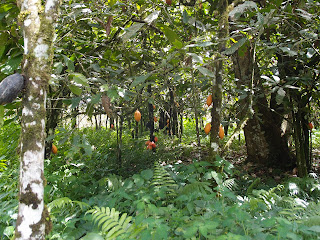 |
| after meeting picture with Ntale farmer's group and the Chief |
 |
| After meeting - A taste of Cameroonian Makiro fish with rice |
 |
| In Ntale village, cocoa beans drying drum donated by EU |
 |
| Always not easy to travel during rainy season |
 |
| We asked questions to the cocoa farmers, in both Pidgin English and formal English :) |
 |
| Cocoa trees - yellow pods are ready to be harvested! |
 |
| one day trip to the crater latke Bermin Lake - beauty as those lakes in the Switzerland |
 |
| take a quick glimpse of the Wednesday morning market |
Cocoa
plantation (theobromo cacao Linn) is one of the main tree-based system in West
Africa. In Cameroon, average yields of cocoa are low because of several
reasons: the farmers tend not to use synthetic fertilizers to increase
productivity, and aging of cocoa plants, lack of means to tackle pest and
diseases. Production of cocoa depends largely on small holders cocoa producers.
And because of lack of marketing knowledge and business management skills, many
of theses smallholders farmers are exploited by the middle-men or licensed
buying agencies (LBAs) when they sell their dried cocoa beans to these small
buyers, who will use false weight to deceive the farmers. Since the
liberalization of the cocoa purchasing market, there are no more fertilizers or
chemicals subsidies for the farmers. In order to get to know the current
problems faced by local farmers and encourage the farmers organised to get
technical and financial support by forming farmers group or cooperatives, 2
weeks ago, Nature Cameroon held meetings with cocoa farmers groups in 4
villages in the Nguti Subdivision : Bambe/ Ntale/ Mungo Ndor and Ekenge. On the
Monday of 8th October, we took a 4-wheels vehicle (locally called
“pick up”, at the back of the truck you can fill up with 20+ passengers and a
heap of goods and luggage. The first meeting was held in the Chief Palace of
the village Ntale, more than 40 farmers attended the meeting and they are all
belonged to 2 cooperatives. We prepared a questionnaire with a list of
questions concerning productivity, working condition and marketing issues. We
also tried to find out the organisation problems of the cooperatives and see if
we can look for solutions together. To sum up problems faced by the cooperative
groups:
1)
Evacuation
of dried cocoa beans during the rainy season from July till end of October
because of bad road systems that connect the villages and the main town e,g,
Komba, where all cocoa transactions are done here and beans are sent to Douala
Port for export.
2)
Farmers
are lack of means of transportation and delivery of their dried beans become
impossible.
3)
Lack
of management trained staff or expertise in the cooperatives. Farmers don’t
have knowledge on managing their business and they are constantly treated by
small local buyers.
4)
No
first hand market price information, and lack of stable electricity supply in
villages is the key issue.
5)
Expensive
chemicals in the market and threat of pest and diseases such as fungi infection
of black pod disease.
6)
Lack
of financial means to enable the farmers to put forward further measures to
improve farm management and planting materials.
We talked
with the grass-root farmers and collected all necessary information from them,
we will find ways to collaborate with the Nguti Subdivision Agriculture
Delegate to get technical support and our ultimate aim is to look for better
buyers such as exporter, to deal directly with the farmers. So that the they
can earn the best out of their produce, and are able to pay for school fees for
their kids.
The
villagers are very welcoming and they prepared fests for our visit. The Chief
of the villages attended the meetings and I feel that they have high
expectations from us. I totally felt the weight behind all the warm welcoming
and food, and I hope that we will work hand in hand with farmers, farmers
groups and regional platforms to influence decision making and work for the
economic benefits of the farmers.
I spent 4
days in the villages and stayed in Ntale, a focal point among all villages that
we visited this time. It was not funny and enjoyable to travel on bad roads
during the rainy season. As many Cameroonians have told me, I have experienced
and witnessed the worse road conditions this time, and by next time when I come
back to Cameroon, I will be prepared.
From holding meetings with farmers, I have a chance to talk to them face
to face and get to know their urgent problems and what’s making them suffer. It
is ridiculous that the government has not invested much on improving the infrastructure in the south west region, although it has the highest
cocoa production. This concerns historic factors and power relation between the
Anglophone and Francophone region in the country. Next time I will write more
about my visits to some cocoa farms around Nguti.
No comments:
Post a Comment